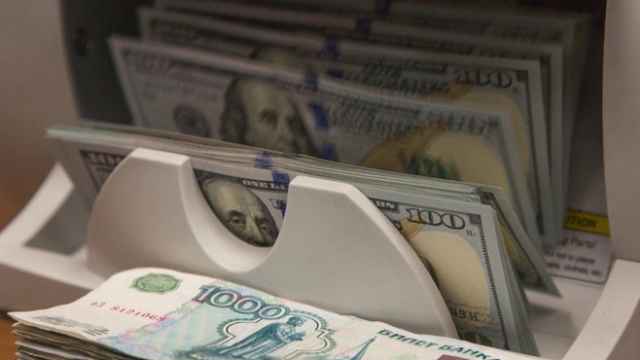LONDON — Dollar bonds of Russian companies suffered a fresh selloff on Monday, as the ruble's fall past the 60-per-dollar level and the threat of more sanctions fanned fears about future debt repayments.
Russian financial markets are reeling, with dollar-denominated stocks chalking up a 10 percent loss on Monday — their steepest one day fall since March — while yields on local and hard currency sovereign debt are at levels unseen since the 2008-09 global crisis.
The ruble tumbled by some 8 percent on the day to around 63 per dollar with the currency having dropped by more than 47 percent against the greenback since the start of the year — a fall almost matched by oil prices.
The currency's relentless depreciation is likely to create huge debt repayment headaches for companies, especially those that lack dollar revenues or are barred by sanctions from accessing overseas capital.
The corporate sector's desperate scramble for dollars for future debt servicing is at least partly behind the ruble's losses, analysts reckon.
Adding to pressure on Russian markets was news that the U.S. Congress had passed a bill setting out tougher sanctions on Moscow over its involvement in Ukraine. President Barack Obama has yet to sign the bill into law.
Jefferies analyst Richard Segal said the selloff in Russian companies' eurobonds was "mirroring the plunge in the ruble even as oil prices are unchanged on the day."
"Dollar liquidity is in short supply, and many corporates are believed to be buying dollars for debt repayment and precautionary purposes," Segal added.
Bonds from banks such as VEB and Russian Agricultural Bank saw their dollar issues tumble by 0.5 cent to 4.3 cents in the dollar respectively on expectations that the ruble's collapse will trigger a rise in bad loans.
Sberbank's 2017 dollar issue is now trading at 88 cents in the dollar, after starting the year trading well above par.
The selloff has not even spared exporters which may benefit from a cheaper ruble. Bonds from big oil firms LUKoil and Rosneft for instance fell by between 1.0 and 2.0 cents in the dollar.
"This is driven by the price of oil and the sharp fall of the ruble — it is certainly not driven by the fundamentals for the corporates," Commerzbank strategist Apostolos Bantis said.
But while he saw the bonds as "oversold," more losses are likely, he warned.
"I think with the current valuation levels a lot of people may be forced to sell, and that creates a bigger selloff than what should have been the case," Bantis said.
The selloff is reflected in the benchmark corporate debt index, JPMorgan's CEMBI, which has seen yield spreads widen less than 100 basis points this year, while Russian spreads have more than doubled to above 1,000 bps.
The cost of insuring exposure to Russian debt jumped to 536 bps on Monday — the highest since March 2009 and well beyond the key 500 mark hit earlier in the day, data from Markit showed.
A Message from The Moscow Times:
Dear readers,
We are facing unprecedented challenges. Russia's Prosecutor General's Office has designated The Moscow Times as an "undesirable" organization, criminalizing our work and putting our staff at risk of prosecution. This follows our earlier unjust labeling as a "foreign agent."
These actions are direct attempts to silence independent journalism in Russia. The authorities claim our work "discredits the decisions of the Russian leadership." We see things differently: we strive to provide accurate, unbiased reporting on Russia.
We, the journalists of The Moscow Times, refuse to be silenced. But to continue our work, we need your help.
Your support, no matter how small, makes a world of difference. If you can, please support us monthly starting from just $2. It's quick to set up, and every contribution makes a significant impact.
By supporting The Moscow Times, you're defending open, independent journalism in the face of repression. Thank you for standing with us.
Remind me later.





